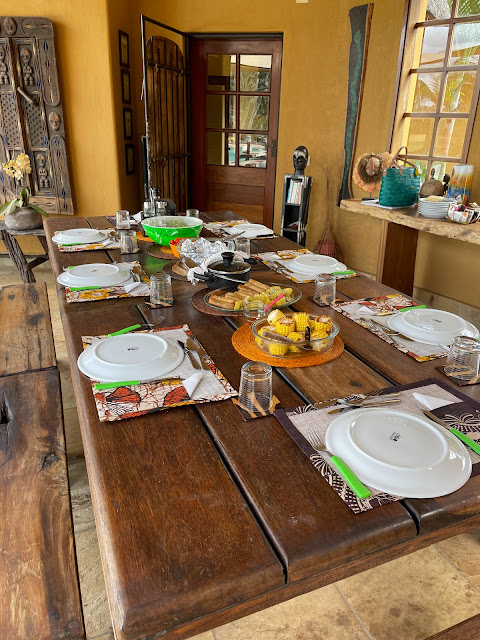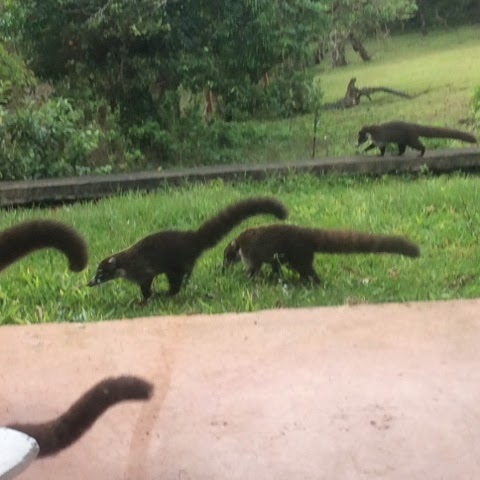Sundays in Mozambique
First some history
In 1498 Vasco da Gama first arrived in Mozambique and brought Portuguese language and "culture" to Eastern Africa. Portuguese East Africa was born. It's a complicated history and one I am only beginning to understand.
I do know that Salazar who was Portuguese Prime Minister for Life (he died in the late 60's I think) declared in the 1940's that Mozambique was an integral part of the pluri-continental and multiracial nation of Portugal as a way to assimilate the local population into Portuguese culture.
But, Colonialism sucks and Mozambican opposition to Portuguese colonialism led to an ugly ten year war to become an independent nation in 1974. I'm told that many of the Portuguese families left after the war but some stayed. I think about 2% of today's Mozambique population describe themselves as white Portuguese.
If a ten year war wasn't enough, following liberation, there was a 20 year civil war between FREIMO (Front for the Liberation of of Mozambique) and a so-called anti communist group, RENAMO, sponsored by South Africa and Rhodesia. (NOTE: I so wish Ian and Patrick Nagel had recorded their memories of this period because Ian had a front row seat as the Trade Commissioner in Rhodesia and Patrick was a journalist for the Globe and Mail in Zimbabwe just after independence. Both were such great story tellers).
Anyway, it was an especially ugly war and as a dear friend recently wrote me ..." when I was there mid to late 80s it was still engulfed in war. There were no restaurants, hotels, food stores etc. except the Loga Franca. The main currency was beer. You could pay $5 to get a case of beer and sell for 100 times that. A ticket to Portugal cost 4 cases of beer. The only thing they had was prawns. At night we watched them fight on the other side of town watching the tracer bullets and rockets go back and forth. There was a restaurant at the end of the beach near the edge of town. It had no food, It think it was a Greek place. Anyway if you wanted to eat there you had to go two days in advance and order though mostly it was seafood. Or else you could bring your own food and they would cook it for you. Some Russians were killed on the beach when they sat on landmines placed in the beach sand."
Can't imagine what life must have been like.
Fast forward to today. I think the cultural part of the Portuguese colonial strategy worked. The linga franca of Mozambique is Portuguese, although (as it is globally) almost all professionals speak English and/or French too. Multiracialism, the policy of Salazar, has worked and, at least in my experience, Mozambique is the most multi-racial place I have ever experienced. Race doesn't seem to be the binary issue it is in North America or Europe. Thus, generations of mixed race families with various national, ethnic and racial identities have created this interesting fluid mix of people (at least in the coastal communities). And, the culture of Mozambique - while distinctly African - still has vestiges of Portuguese influence, such as Sunday lunches.
It seems to be a tradition that every Sunday, families gather, spend the day and eat a huge meal mid day. An odd twist to this is that it seems the middle class of Maputo also have weekend houses in Matola, a suburb of the city and about 45 minutes away. Families seem to have acreages with house, pool, garden, play areas and so forth. Whereas in Maputo most of the homes are built next to each other with little garden space (Sierra's is somewhat unique). We've been to Sunday meals in Matola twice since I've arrived, both equally interesting.
This past weekend we spent Sunday with Patricia and Mia Couto at their home in Matola, along with several of their friends. Patricia is a haematologist and "third generation" Mozambican who Sierra met when Patricia was on an exchange and Sierra was a Resident at UCSF. They now work together at the hospital in Maputo.
Mia Couto is an environmental biologist (Botanist) and a Mozambican writer who has won the most important literary award in the Portuguese language and was recently nominated for the Booker prize for his novel, Woman of the Ashes. Who knew? I just thought we were going for lunch. However, one of the coolest things he does is preserve palm trees . He collects seeds from all over the tropical world to grow on his property. Needless to say we nattered about plants before and during lunch. And politics, of course.
The Palm tree below is Raphia australis. It only grows in Mozambique and South Africa and Mia tells me there are only 85 individual trees left in Mozambique and this is one of them. Yet another endangered species!
So, Sunday lunches. You never know what is going to be served but it is always tasty.





Comments
Post a Comment